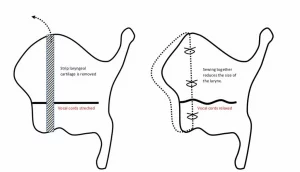The connection between emotional wellbeing and voice quality is stronger than many people realise. Mr Nick Hamilton, consultant laryngologist at The London Clinic and One Welbeck, frequently treats patients whose vocal problems stem from anxiety, stress, and emotional tension.
His comprehensive training, including his fellowship at the MGH Voice Center in Boston, has given him particular insight into the complex relationship between psychological factors and voice disorders.
How does stress physically affect your voice?
Stress directly impacts your voice by causing muscle tension throughout your neck, throat, and vocal cords. When you’re anxious, these muscles tighten, preventing your vocal cords from vibrating freely and naturally.
This tension can make your voice sound strained, higher-pitched, or breathy. Some people experience complete voice loss during periods of extreme stress or anxiety.
Your breathing patterns also change when you’re stressed, becoming shallow and rapid. Since proper breathing is fundamental to good voice production, these changes significantly affect your vocal quality.
What are the common voice symptoms of anxiety?
Anxiety-related voice changes include trembling or shaky voice quality, particularly noticeable when speaking in stressful situations such as public speaking or important meetings.
Many people experience a tight, constricted feeling in their throat when anxious, often described as having a “lump in the throat” sensation that affects their ability to speak clearly.
Voice breaking or cracking is another common symptom, particularly in situations that trigger anxiety responses. Research shows that 15% of people experience voice changes specifically related to anxiety disorders.
Can chronic stress cause long-term voice problems?
Persistent stress can lead to chronic muscle tension that permanently affects your voice quality. Mr Hamilton often sees patients at The London Clinic and One Welbeck whose long-term stress has resulted in ongoing vocal difficulties.
Chronic stress can also contribute to acid reflux, which damages vocal cords over time and creates additional voice problems requiring specialist treatment.
The combination of physical tension and acid reflux creates a cycle where voice problems cause additional stress, which in turn worsens vocal symptoms.
How does Mr Hamilton treat anxiety-related voice problems?
Mr Hamilton’s approach addresses both the physical and psychological aspects of stress-related voice problems. He often recommends voice therapy that specifically targets relaxation techniques and proper breathing methods to reduce vocal tension.
His comprehensive understanding of voice disorders, developed through his research and clinical experience, enables him to distinguish between anxiety-related voice changes and other conditions that might present similarly.
He works collaboratively with other healthcare professionals when necessary to address both the emotional and physical components of anxiety-related voice issues.
What techniques can help manage stress-related voice changes?
Deep breathing exercises help counteract the shallow breathing patterns associated with anxiety. Mr Hamilton teaches diaphragmatic breathing techniques that support both relaxation and optimal voice production.
Regular vocal warm-ups can help reduce muscle tension and prepare your voice for daily use, particularly important if you know you’ll be in stressful situations.
Mindfulness and relaxation techniques specifically targeting the throat and neck area can help reduce the physical tension that affects voice quality.
When should I seek help from Mr Hamilton?
Consult Mr Hamilton if anxiety-related voice changes persist beyond the stressful situation or begin affecting your daily life and communication abilities.
Studies indicate that 42% of people with anxiety disorders experience some form of voice-related symptoms, making professional guidance particularly valuable for this population.
His expertise in complex voice disorders means he can identify when anxiety-related voice problems might indicate underlying physical conditions requiring different treatment approaches.
Can treating anxiety improve my voice?
Addressing underlying anxiety often leads to significant improvements in voice quality. Mr Hamilton frequently observes dramatic voice improvements when patients successfully manage their stress and anxiety levels.
The combination of voice therapy techniques and anxiety management strategies typically produces the best outcomes for patients experiencing stress-related voice problems.
Professional treatment addresses both the immediate voice symptoms and the underlying causes, providing long-term solutions rather than temporary fixes. You can book a consultation with Mr Hamilton at The London Clinic or One Welbeck by calling 020 7034 6053.



